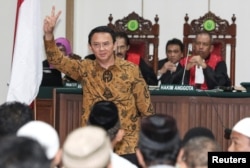Indonesia’s Supreme Court has unanimously ruled that citizens can identify on their national ID cards with faiths outside the six religions officially recognized in the constitution. It is being hailed as a landmark decision for religious tolerance.
Indonesia has never been a completely secular country since its independence in 1945, but it has enshrined religious tolerance in its state ideology, known as Pancasila. But that tolerance was rather narrowly circumscribed, recognizing only six major religions — Islam, Hinduism, Buddhism, Protestantism, Catholicism, and Confucianism — and, in practice, specific strains of each of those. (Shiite and Ahmadiyya Muslims, for instance, have longed faced discrimination as they are regarded as deviant strains of the majority Sunni Islam.)
The 2006 Population Administration Law redoubled the pressure to conform to these orthodoxies by requiring Indonesians to declare themselves as one of those six faiths in order to get an ID card, which is a gateway to social services, education, marriage registration, and burial of family members. That marginalized the 400,000 followers of native faiths, like indigenous peoples who practice strains of animism and practitioners of regional folk religions like Javanese kejawen and Sundanese Wiwitan.
In recent years, many indigenous people have converted to Islam in order to get ID cards.
That will no longer be necessary.
The new ruling came about after a 2016 lawsuit issued by four representatives of indigenous faiths from different islands, who asked the court to review the Civil Administration Law. It is being hailed as a positive development for religious tolerance in Indonesia, which has suffered of late from the rise of aggression against minorities and from the sectarian 2017 Jakarta election, where the Christian incumbent governor was accused of and jailed for blasphemy.
Return to Postcolonial Tolerance
The ruling, which was issued last week, will be effective immediately, according to Indonesia’s Home Affairs Minister.
The compulsory identification with a religion in order to obtain social services dates back to the Suharto military dictatorship, said Bonar Tigor Naipospos of the Setara Institute, a religious affairs think tank.
“The New Order government [of Suharto] forced every citizen to identify with one of the six recognized religions. Because they were particularly afraid of atheists, whom they thought to be Communists. Ever since then, from the Suharto government’s policy to instate a ‘religion’ column in the national ID card, followers of local religions have faced discrimination.”
“The impact of this decision is to reduce discrimination in marriage, birth certificates, children's education, and the opportunity to join the military and police,” said Naipospos. “But it’s not a new norm; rather, it restores the constitutional right of Indonesian citizens to freely choose their faith that existed during the reign of [Indonesia’s founding president] Sukarno.”
Syncretic Traditions
Indonesia is about 87% Muslim and has the world’s largest Muslim population today. But Islam in the island nation has often been overlaid on indigenous, animist, and traditional belief systems, as well as Hindu and Buddhist practices from the Medieval era, particularly in Java.
Kejawen, for instance, is a syncretic Javanese religious tradition that includes elements of Hindu Tantra rituals and Sufi mysticism and encourages the pursuit of self-knowledge through meditation and localized rites.
Even Suharto identified with kejawen practices. But since it is outside the six recognized faiths, kejawen adherents could not officially describe themselves as such.
One of the plaintiffs in the ID Card lawsuit was a member of the Kejawen-affiliated Sapto Darmo movement who said he was not able to bury a family member at a public cemetery because the religion column of his ID card was left blank.
“I consider myself a spiritual person, far from rituals, and I don’t care about any labels…but I am thinking of changing [my ID card] in the future to the belief system that I consider closest to mine, which is Kejawen,” said Dea Safira Basori, a dental student in Jakarta.
Unclear Reach
But not everyone is convinced the ruling will improve religious tolerance. Members of the Shia and Ahmadiyya Muslim minorities will still likely face social and bureaucratic hurdles, because their versions of Islam are not officially sanctioned.
“I do not think this will make a difference for us,” said Ali Hussain Alatas, a Shia Muslim and secretary of the Islamic Cultural Center in Jakarta. Islam was already an option for his community's ID cards. He said the problem is that many Indonesians don’t consider Shia to be a valid form of Islam.
And Indonesia’s National Ulama Council, the nation’s highest Muslim authority, has called the ruling a “regression into the stone age.” So enforcing the recognition of indigenous faiths on a local level will be no small feat.







